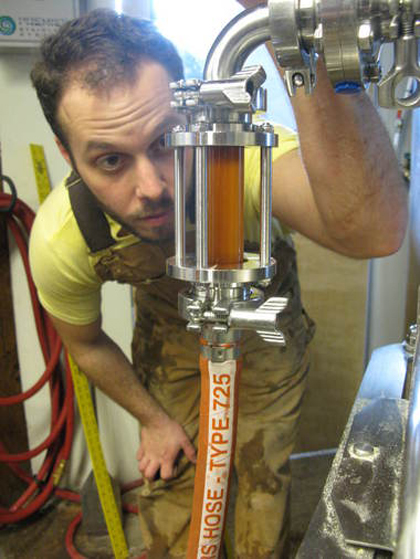Pull Up A Stool with Ben Edmunds
Breakside Brewery
All About Beer: With no professional experience and brewing for a brand new brewery in a city renowned for its beer culture, were you intimidated when you first started?
Yeah, absolutely. For months I had a huge amount of anxiety. I was confident that I could make good beer, but I wanted to enter the market at a level of quality that I was happy with and would make a good mark for us in the beer world here.
We were shooting high and so I was pretty nervous about that. But still, when you’re brewing in this town—there’s a lot of good brewers and really devoted beer lovers—every time you release a new beer you want it to meet the expectations of what Portland beer is meant to be.
What is that community of brewers like and how are you fitting in?
I’m always astounded by how open and interested people are. The people that I feel like I’ve learned from the most are the ones that are the most open. The other day, I was down at Upright Brewing chatting with (owner/brewer) Alex Ganum. I told him I had an issue come up and say, “I wonder what you would’ve done in that situation?”
It’s a great industry where you can do that. It’s a huge affirmation when other brewers come and drink at Breakside and I make it a point to go and taste as many of the new beers that they’re releasing as often as I possibly can.
That can’t be a bad thing to brew at two celebrated breweries in Beervana and find your primary brewmaster demands on the rise.
Yeah, we’ve started looking at our expansion plans. We’ve accelerated our plans to have beer in other markets. At the same time, we’re mindful of not overreaching too much even though we have a very successful small brewpub. We need to scale up appropriately. We’re going to move to a much bigger system and brew under capacity, hopefully, for the first few years.
Having gone to Yale for undergrad, then studied brewing at Siebel, followed by training at the Doemens Academy in Munich—Where did you develop your penchant for experimentation?
I like to think that when we experiment, we do so with some sort of method; we don’t just throw a bunch of random crap into the boiler or fermenter. Even though it clearly flies in the face of Reinheitsgebot to use chilies and chocolates and fruits and spices in beer, when we do, we do it with the same methodology that a German brewer would create their Helles. I’m doing the research on what other people have done to find out what other information is out there. Then, I try to tweak it to the profile we want.
What I take from the Germans is not necessarily their grain bill and their ingredients list but their appreciation for precision and investigation.
So you maintain a classical approach without sticking to the classics?
I always like to point out that we make a lot of “normal” beers, too.
True. Sorry. It’s almost easy to look past Breakside’s Dry Stout and IPA when you release so many larger projects like the cocktail beers series using spices and bitters, and the non-brewing-professional collaborations that saw beers like Margaret’s Beerscht brewed with beets.
I’m always seeking out the people who’ve done it and asking them questions. In the case of the beets, that means emailing Odells and saying, “Can you tell us what you learned from brewing Mad Farmer’s Ale.” Step two harkens back to my roots as a homebrewer. There are vast forums of homebrewing knowledge on the Internet. While I take everything I read with a tremendous grain of salt, I started to see patterns after spending an hour reading about people who’ve made beet beers. That’s how I get a sense of what might or might not work.
And what’s the feedback like that you get directly at the pub, especially with beers you’d never brewed before?
It’s invaluable. I try to be really honest about my opinions of the beers. The beet beer, I don’t think is the greatest beer I’ve ever brewed. It was perfectly fine and we achieved what we were trying, but next time I want to brew a beet beer, there are five or six things I’ll tweak. But Scott Lawrence, one of Breakside’s co-owners, expected to hate that beer and ended up loving it. Having said that, you can’t please everybody, but I hope everyone who comes in can always find two to three beers that they really like.


Leave a Reply